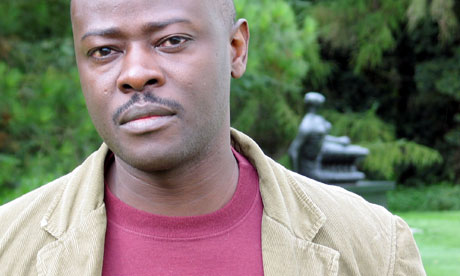
The brutal mechanics of our lust for oil, as Hollywood thrillers from The Pelican Brief to Syriana prove, lend themselves to tales of heroic underdogs unmasking the machinations of big petrobusiness. Helon Habila's new novel turns these certainties on their head. Oil on Water follows two journalists – keen, young Rufus and ageing, cynical Zaq – as they pursue the kidnapped European wife of an oil executive into the badlands of the Niger delta. But "the story is not always the final goal", Zaq tells Rufus at the beginning of their Conradian journey upriver, and their quest for the truth soon turns into something more complex.
As they struggle up the river in a canoe, guided by an old man and a young boy, the reporters encounter nightmarish scenes of devastation: "dead birds draped over tree branches, their outstretched wings black and slick with oil; dead fishes bobbed white-bellied between tree roots". By the flickering light of oil flares, they find some villages abandoned, their fields and water contaminated; others scrape a miserable existence on the frontline of a civil war between the army and anti-government guerrillas.
Oil on Water lays bare the real-life tragedy of the Niger delta, in which petrodollars warp human relationships as surely as leaking crude poisons birds and fish. A village that accepts an oil company payout, Rufus discovers, is initially jubilant. TVs and fridges appear in impoverished homes, presided over by the uncanny orange flare "that burns day and night". But then livestock, crops and finally villagers begin to die, while the survivors are bought off with do-nothing oil company jobs, join militant groups or turn to kidnapping for profit. The only community to escape this fate is an island inhabited by a white-robed animist cult who reject oil money – though even they survive only under the patronage of a shadowy militant leader.
As environmental destruction mirrors political corruption and social breakdown, Rufus and Zaq's journey takes on a metaphorical force. Habila's debut novel Waiting for an Angel, which won a Commonwealth Writers' prize in 2003, traced an idealistic young reporter's efforts to piece together the abuses of the military regime that governed Nigeria in the 1990s. "Every oppressor knows that wherever one word is joined to another word to form a sentence, there'll be revolt," Habila – who worked as a journalist in Lagos – wrote. The fate of the writer Ken Saro-Wiwa, whose execution features in Waiting for an Angel, also haunts Oil on Water. Rufus and Zaq must struggle to stay alive among the many tribal elders, environmentalists and reporters who end up dead, caught between the military (who despise "fancy ideas about human rights"), the militants and the faceless oil multinationals.
But Habila's powerful, accomplished third novel displays a growing pessimism about journalism's capacity to effect change – as well as providing a nicely cynical dissection of the media's relentless appetite for sensation. Even Rufus, initially delighted that the "shrill urgency and tragedy" of his stories lands them on the front page, becomes increasingly disillusioned. His role model, Zaq, became the most famous reporter of his generation for his groundbreaking "feature stories about everyday things, ordinary lives". Now he too is compromised: underemployed, reliant on cheap whisky, ravaged by a nameless variant of dengue fever. Nigeria's journalistic conscience is rotting from the inside out.
Fittingly, the story they are chasing is not what it seems. When Rufus, fleeing for his own life, finally catches up with the kidnapped woman, he makes a shocking discovery about her kidnapping. His long-awaited scoop is less a triumphant unmasking of evil than the slow realisation that, in a state so addicted to oil, the truth is as mazy and unfathomable as the poisoned delta waters.

